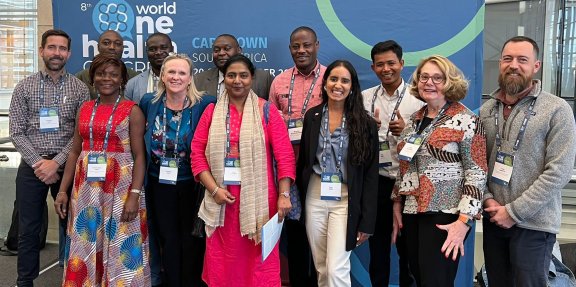
As a launching point for STOP Spillover’s final year of implementation, STOP Spillover presented its recent research and findings at the 2024 World One Health Congress (WOHC). The event took place in Cape Town, South Africa from September 20-23 at the Cape Town International Convention Centre. This was the eighth year that the event has been held. A large and diverse population of presenters attended, ranging from PhD students to Senior Ministry Officials representing all One (OH) Health sectors. Scientists and OH practitioners from across the African continent were largely represented.
The WOHC brings experts and stakeholders across the continent together to facilitate discussion of major One Health challenges and share research data, policy development, and network. Relevant world experts, donors, and stakeholders are exposed to a wide range of presentations and discussion, from pathogen surveillance to gender issues. STOP Spillover had a large presence at the event and featured a total of 12 presentations. Two of the presentations were oral, and the rest were displayed posters.
STOP Spillover’s work in Côte d’Ivoire was popular among attendees at WOHC, with seven posters referencing spillover threat reduction activities in the country. Arsène Mossoun shared two poster presentations, “Joint risk assessment of Ebola and Lassa viruses at the human-wildlife interface in the Tonkpi region, District de Montagnes,” and “Mapping of areas at high risk of zoonotic pathogen transmission and disease monitoring at the human-wildlife interface in the District des Montagnes in Côte d’Ivoire.” The posters garnered many attendees asking questions and providing important feedback on the work. Arlette Dinde displayed the poster “Introduction of new tools and support for biosafety practices among wild meat handlers and processors in Côte d’Ivoire to prevent zoonotic disease risks.” Lessons presented by this poster demonstrated the applicability and integration of biosafety interventions in this important high-risk setting.
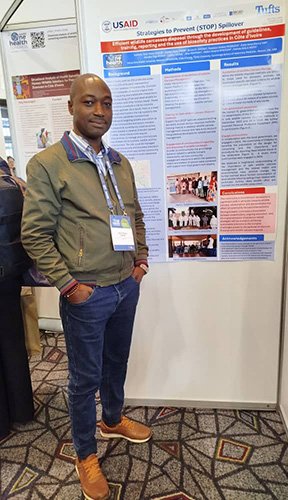
Ellélé Aimé Marius Yapi presented the poster “Expanding access to wastewater monitoring in countries with low levels of sanitation infrastructure: Effectiveness of active and passive wastewater effluent sampling in Côte d’Ivoire.” Data and methods presented demonstrated to participants STOP Spillover’s innovative and cost-efficient approach to community surveillance for high consequence pathogens. Diafuka Saila-Ngita showed the poster “A conceptual framework for multi-sectoral zoonotic disease surveillance based on human-animal-environment interfaces in Côte d’Ivoire,” which illustrated the importance of frameworks for demonstrating how effective interventions can address spillover risks at the wildlife-human interface. Tizié Thierry Zan-Bi visually displayed “Efficient wildlife carcasses disposal through the development of guidelines, training, reporting, and the use of biosafety practices in Côte d’Ivoire.” The poster contributed to the collective findings of several research studies at the WOHC on handling of carcass disposal and wildlife outbreak investigation.
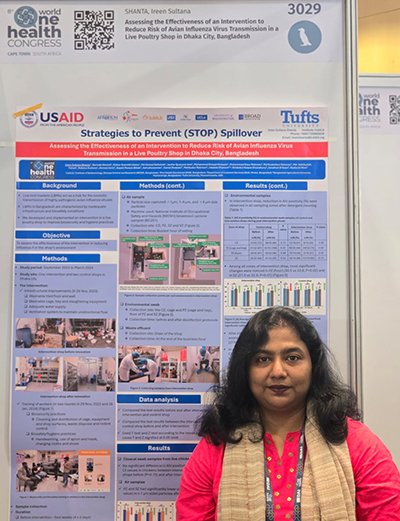
Ireen Sultana presented visually “Assessing the effectiveness of an intervention to reduce risk of avian influenza virus transmission in a live poultry shop in Dhaka City, Bangladesh.” The data presented demonstrated that the STOP Spillover biosafety intervention reduced the amount of highly pathogenic avian influenza virus in the live bird market, potentially reducing risks for traders, vendors, and consumers alike. Hellen Amuguni presented her poster, “Using outcome mapping and trials of improved practices to identify risk factors and develop interventions that reduce risk of zoonotic spillover infections,” which provided solutions for how to respond to early detection of zoonotic virus.
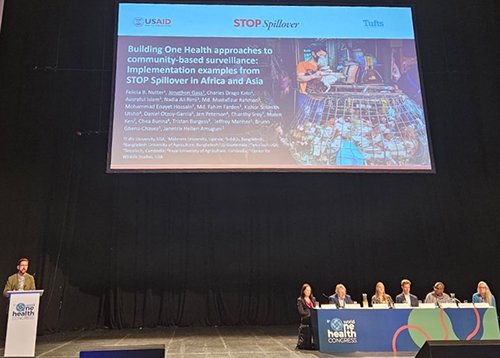
Jon Gass shared three presentations one of which was oral. He gave the talk “STOP Spillover’s approach to community surveillance and implementation across Cambodia, Bangladesh, and Uganda” co-authored by Felicia Nutter. Displaying as posters, Dr. Gass presented “A protocol for evaluating community-level zoonotic disease risk-reduction interventions” and “Best practices for animal value chain interventions to reduce zoonotic disease risks at markets and farms: The USAID STOP Spillover approach.” Lastly, Sok Dou gave the oral presentation “Presenting results of bat guano farming in Cambodia” to an audience of 100+ global One Health practitioners and researchers.
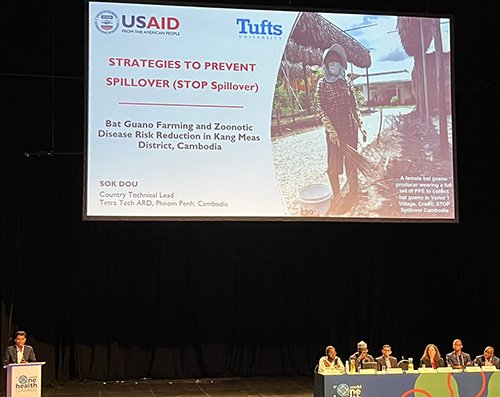
This is the first conference of this size that STOP Spillover has participated in, and it was an all-around success. All presentations shared were well received, and it was an excellent opportunity to highlight for the international community STOP Spillover’s four years of work. Over the next year, STOP Spillover plans to continue to share its stories and achievements with a global audience. The presentations at the WOHC set the stage for a final year of results dissemination. Stay tuned for more novel insights and results from our public health interventions that impact communities faced with threats from viral zoonoses.